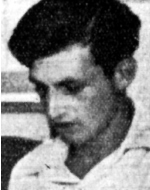Akiva, the son of Sophia and Moshe (Moritz), was born on September 16, 1925 in Germany, in the city of Trier in the Rhineland. Graduated from the elementary school in Cologne. He was a member of the Scouts and Pioneers youth movement Habonim. From the day the Nazis came to power in Germany, the situation of the Jews in the country deteriorated greatly. In September 1939 World War II began, and a short time later the Jews were concentrated and many of them were sent to the camps. In 1940 Akiva and his family were sent by the Nazis to Buchenwald concentration camp. The Buchenwald camp, near Weimar, was established in July 1937 and was one of the largest concentration camps in Germany: about 130 satellite camps were affiliated with it. The Jews who were incarcerated there were exploited in the work in the quarry, and many of them perished. During the war hundreds of thousands of people passed through it. Akiva’s parents and brothers perished in the camp. Only he survived, moved from camp to camp and managed to survive the war. With the influx of refugees, Akiva moved to Italy and joined a group of religious youth who founded the Torah V’Avodah training group in the city of Aviti, near Milan. In the religious community, under the guidance of older counselors, in the atmosphere of tranquility and tranquility of the wonderful villa and garden, one of the richest people in Milan – Engineer Meir – made available to the training kibbutz, Noah Akiva a bit of his troubles and began to find his way in life. On January 9, 1946, Akiva boarded the Vado Ligure in Italy on the small cargo ship “Enzo Sereni” on his way to Eretz Israel. The ship, which was carrying 908 members of various youth movements, was organized by the “Mosad for Aliyah Bet” of the Haganah. Her voyage was characterized by many difficulties – overcrowding, stormy seas and water and food shortages – and her passengers suffered great suffering. As they approached the shores of the country, the ship was discovered by the British. They forced her to enter the port of Haifa, took over the Ma’apilim and led them to the Atlit detention camp. It was the first ship to be intercepted by the British, and its immigrants were among the first to be arrested when they arrived in Palestine after World War II. After he was released from the camp, Akiva joined together with a group of immigrants to Kfar Etzion, the first of the Gush Etzion settlements. Only a few of his comrades remained there, but Akiva was one of those who clung to the village’s land faithfully and devotedly. He excelled in his meticulousness and meticulousness in his work, despite being modest and humble in society and the agriculture. Was responsible for the work of the laundromat, took every action and work and carried out the responsibility. In his work he found great satisfaction. Gush Etzion was an isolated island of Jewish settlement in the Hebron Hills. According to the United Nations Partition Plan of November 29, 1947, the bloc was not included within the boundaries of the Jewish state, and immediately after the decision, the Arabs of the area launched attacks on the bloc and the roads from and besieged it from all directions, ), Which, because of the location of the bloc that controlled the road between Hebron and Jerusalem, wanted to conquer it and liquidate it.As with all the settlers in the older bloc, Akiva served in the Haganah as part of the Etzioni Brigade, (Field Force) and was discovered to be a disciplined and responsible soldier. He took an active part in training, guarding and defense, first in positions and then as a runner and liaison officer. He did his job with precision, without being deterred by dangers. In preparation for the decisive battles, the fighters were reinforced by Hagash fighters who arrived in Gush Katif from Jerusalem and from the Religious Religious Party in Tel Aviv. In addition, the Haganah transferred to the area the Palmach fighters from the Harel Brigade, and on May 12, 1948, the Legion’s large attack on the Bloc began, and after the fall of the outposts Akiva was sent to Masuot Yitzhak to expedite reinforcements for the ” The Arab had surrounded everythingThe hills around Kfar Etzion, he managed to transfer ammunition to the people in the outpost. The next day, on May 13, 1948, the last attack on Kfar Etzion took place, and Akiva fought in Oz at position number 3 on the eastern side of the camp. One of the village’s defenders fell that day, many were murdered after they surrendered, and the next day, on the day of the declaration of the state, the three other Gush Katif settlements fell, and Gush Etzion ceased to exist and the remnants of its defenders went to captivity in Jordan. Were gathered in a special operation by the military rabbinate in 1949. Akiva and the rest of the Gush Etzion Bloc were brought to eternal rest in a mass grave On Mount Herzl in Jerusalem, at a state ceremony held on November 17, 1949. The space is a “last scion.” The last remaining victims are survivors of the Holocaust who remained the last remnant of their nuclear family (parents, brothers, sisters, sons and daughters) ), Who had personally experienced the Holocaust in the ghettos and / or the concentration and extermination camps and / or in flight and hiding in the territories occupied by the Nazis and / or fighting alongside members of the underground movements or partisans in the Nazi-occupied territories who immigrated to Israel during or after World War II, And fell in Israel’s wars.
